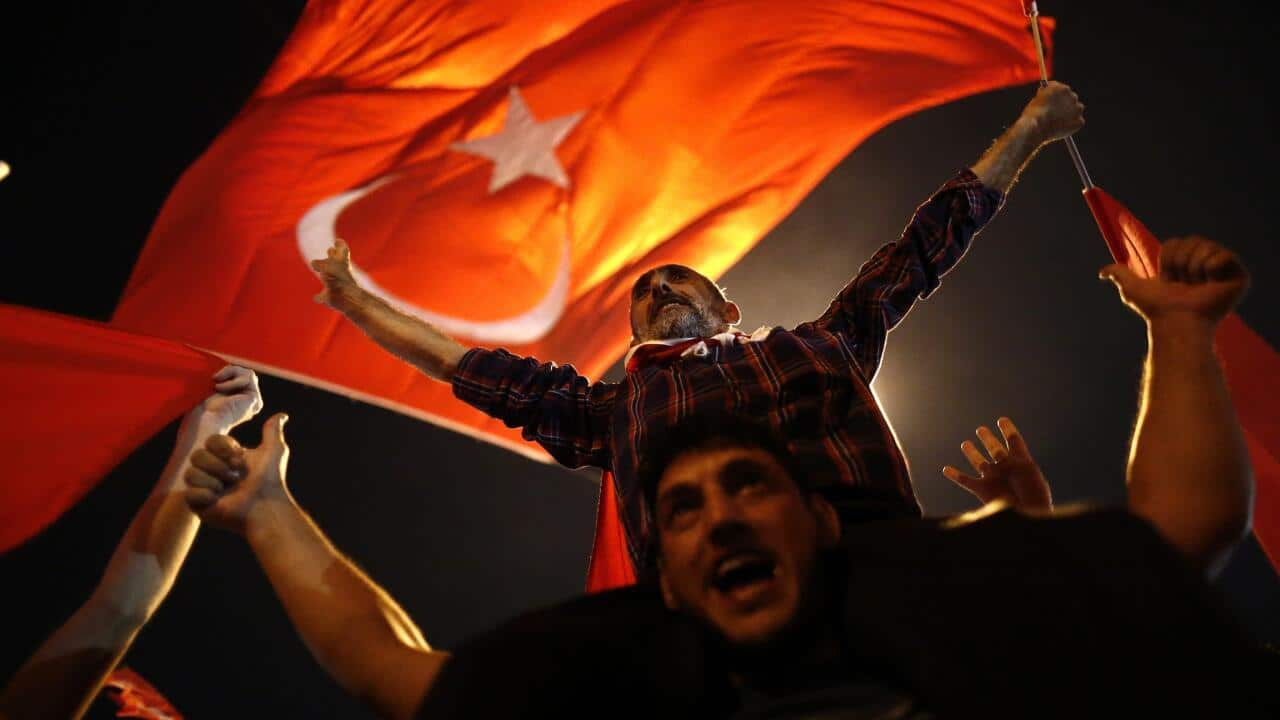Almost 20,000 police, army, judiciary and civil service members have been rounded up as part of Turkey's ongoing search for those behind a recent failed coup.
CNN’s Turkey channel has reported this includes the dismissal of around 30 governors and more than 50 high-ranking civil servants, while thousands of judges and prosecutors have been suspended.
Senior lecturer at RMIT University’s School of Global, Urban and Social Studies, Dr Binoy Kampmark, says it gives Turkish leaders an excuse to crackdown on critics, in a so-called “cleansing of the stables”.
More than 200 people were killed when violence broke out on Friday, when a section of the country’s armed forces attempted to overthrow the government of President Recep Tayyip Erdogan.
Their efforts were thwarted when President Erdogan phoned in to a television news program and called on his supporters to take to the streets, before returning to Istanbul in the early hours of Saturday morning.
Turkey’s Prime Minister Binali Yildirim says scores of civilians were also caught up in the unrest.
State media have published photographs reportedly of some of those people taken in, in handcuffs or wearing only their underwear.
Almost 30 generals and admirals have so far been remanded in custody.
Dr Kampmark said while the botched coup was likely to inspire further hardline measures by President Erdogan, it was proving to be a golden PR opportunity for his administration.
“It’s the perfect opportunity to show the state will remain strong,” he said.
He said the small team of “dissatisfied individuals” never stood a real chance against the might of Turkey’s combined military. He said while there have been successful takeovers several times throughout Turkey’s history, the main difference this time was scale, describing it as a “reckless attempt to seize power”.
He said while there have been successful takeovers several times throughout Turkey’s history, the main difference this time was scale, describing it as a “reckless attempt to seize power”.

People light flares and wave Turkish flags as they gather in Taksim Square in Istanbul. Source: AAP
But, he said, had they gotten hold of Mr Erdogan, the outcome could’ve been fatal.
The incident has led to calls from Turkish officials for the death penalty to be reinstated, drawing criticism from leaders including German Chancellor Angela Merkel, who warned the move could endanger Turkey’s hopes of joining the European Union.
According to Dr Kampmark, whether or not it’s brought back is entirely up to President Erdogan.
“It depends how Erdogan wants to play the game," he said.
“Will he play the reasonable ruler and show mercy?”
Speculation is rife over the chief organisers of the failed takeover bid, with some officials naming a former air force chief as co-leader.
Turkey’s government has maintained cleric Fethullah Gulen is the mastermind, and has called on the United States to extradite him from Pennsylvania.
Related reading

Turkey 'still hunting some coup plotters'
Washington has said it will honour an extradition request – but only if there is evidence linking him to crimes.
Dr Kampmark also has questions over Mr Gulen, saying he heads a well-funded “global network”, who “try to exert influence in a number of ways”.
Mr Erdogan and Fethullah Gulen have been engaged in a feud since 2013.
Turkey is also an important ally for Western nations fighting the self-proclaimed Islamic State group.
- with Reuters


